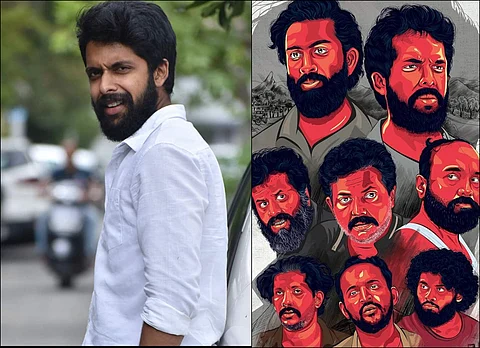

A couple of weeks ago, a big-screen Malayalam release, Chaaver, had its principal characters on the run after a brutal act of politically (or it seemed) motivated violence. But its overall visual derring-do couldn't salvage its muddled politics, hazy intentions, and emotional blandness. But another film, which treads on similar territory and got made a couple of years back, succeeds where Chaaver couldn't, to a considerable extent. While not exactly 'great cinema' material, Ennivar has enough notable positives going for it to make it worthy of recommendation, predominantly the competent performances of actor-composer Sooraj S Kurup and actors Sarjano Khalid with Binu Pappu, Sudheesh and Jeo Baby for company -- and, above all, commendable clarity on the message it wants to deliver. Zero complications.
Never mind that Ennivar, directed by Sidhartha Siva, was seen by only a few. Considering its experimental nature and absence of big stars, a theatre release wouldn't have been ideal. "At a time when the taste of audiences has become unpredictable, I don't think it would've been practical despite the confidence and satisfaction we as a team felt with the final output," says Sooraj S Kurup, who is glad that the film is slowly finding encouragement from those who have seen and liked it.
Unlike Chaaver, which features one-dimensional characters, Ennivar attempts to give us a sense of its two principal characters, played by Sooraj and Sarjano. Most of the information about them, including about the event whose aftermath we see, is relayed through impressively organic conversations between the abovementioned actors, most of it improvised.
"We were simply told about the contents of a conversation or argument and how to express it," says Sooraj. An intense argument scene with Binu Pappu is a testament to this approach. The Kottayam-born musician adds that the team worked to reach a common consensus on what to keep and omit. "We didn't have much time for rehearsal, so it was just a couple of rehearsals without the camera and then going with the final take, after which everything went well."
Sooraj expresses admiration for Sarjano's "best work" and cinematographer Sinto Poduthas for "keeping it simple and unvarnished," in addition to Sidhartha Siva's filming and editing approach. "Most scenes were kept lengthy by Sidharthettan; when certain emotions had to be conveyed, care was taken not to break the shots, opting for multiple angles while maintaining the same length, aiding continuity. Everyone in the team was involved as much as the director. People were open to giving feedback, positive or negative; everything was welcome. Sidharth ettan's set allowed that kind of freedom."
Likening the "undistracted" filming experience in Attappadi to the situation of Ennivar's main characters, Sooraj shares that it felt as though the entire team were in hiding too, with no connection to the outside, unbothered by social media and technology. Collecting a day's food, too, was a task in and of itself. "It wasn't wise to go out after 5.30 pm, considering the elephant activity in the region and the electric fences. So, someone collects the day's food in the morning or noon. Besides, the cold there is not the kind in Munnar or Vagamon; it's so windy. It's freezing cold at around 2-2.30 am in the night. At this time, we shot that conversation scene with Sarjano, which reveals the bond these men share and their backgrounds. Only after we shot it did we realise it came out better than expected. It didn't require many takes, just lengthy angles, and since Sidharth ettan is also an editor, he knew how to do it."
Another positive aspect of Ennivar is the minimal use of music, thereby keeping our focus primarily on the characters. "I had written a score before we went into the shoot, but once filming concluded, I realised that what I wrote before didn't gel well with the footage, so I conceived the score in post-production. The only song which is in the film originated out of a score I composed first."
Sooraj, who began as an assistant director in KB Venu's August Club, starring Murali Gopy and Rima Kallingal, recalls having a strong urge to direct when he set foot in the industry but eventually realised that music is his strong forte. His notable works include The Great Indian Kitchen, Luca and Annmariya Kalippilaanu.
The composer, who recently appeared briefly in Abrid Shine's Mahaveeryar, observes that music isn't an easy field to get into. "I used to work on music for ads, friends' projects, and so on... There was a brief indecisive period following which I realised that I should focus solely on music, so I went to Chennai to study audio engineering. In the meantime, my first project, Valliyum Thetti Pulliyum Thetti, materialised. Chennai offered opportunities for me to associate with various artists. I would say Chennai polished me."
A selective picker, Sooraj prefers working on one project at a time. "I would sometimes commit to my friends' projects out of personal obligation. I don't scrutinise their films. But, generally, I prefer working on something where I have the necessary freedom to exercise my creative muscles. I'm not good at multi-tasking. I've no lofty monetary ambitions because I have alternate options for income. There are musicians who can manage multiple projects efficiently, but I can't say the same for me. I prefer creative satisfaction over deadline-chasing," he signs off.